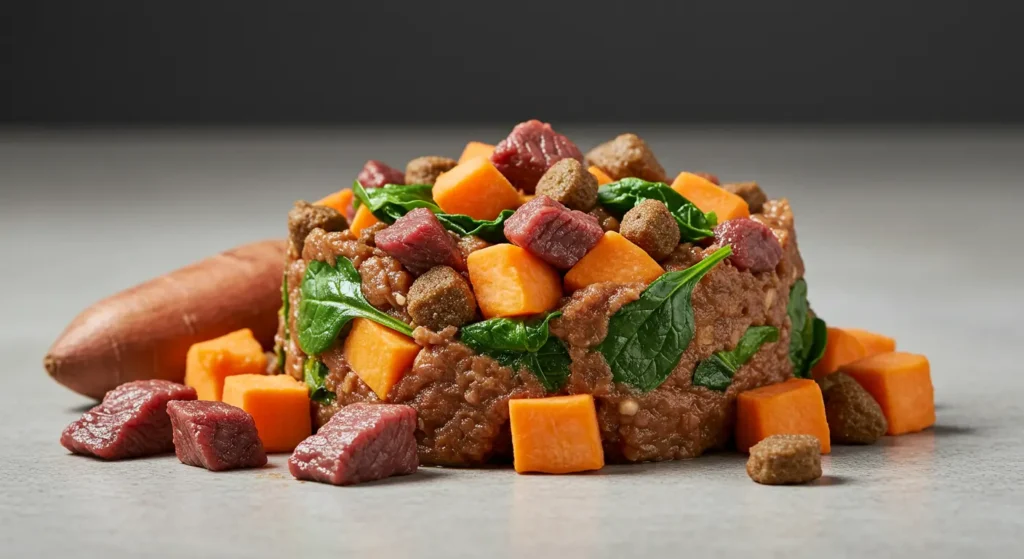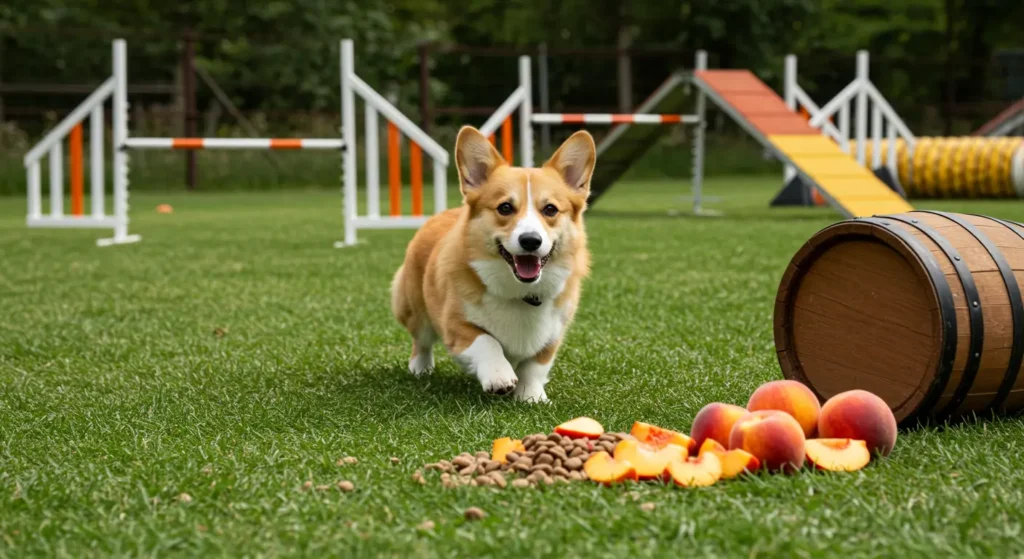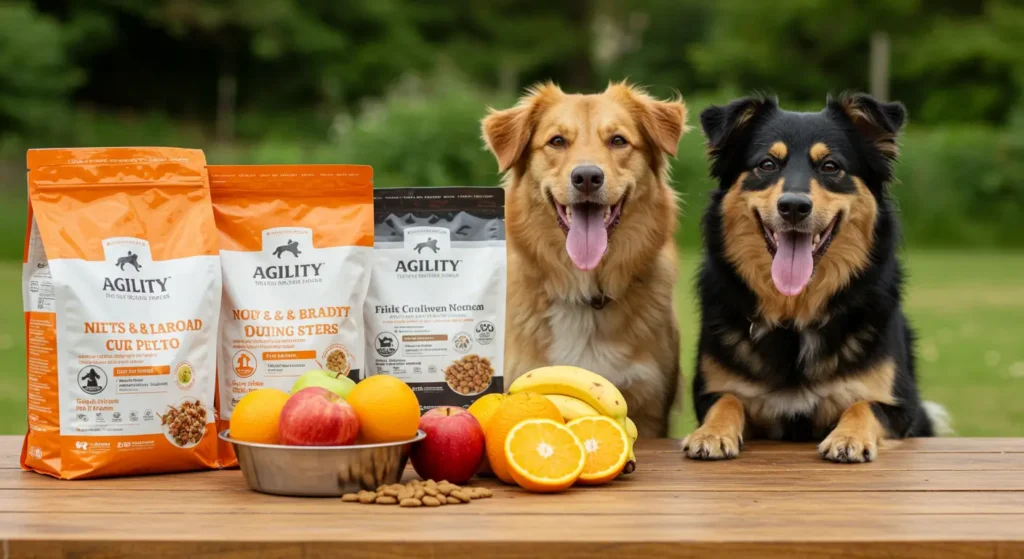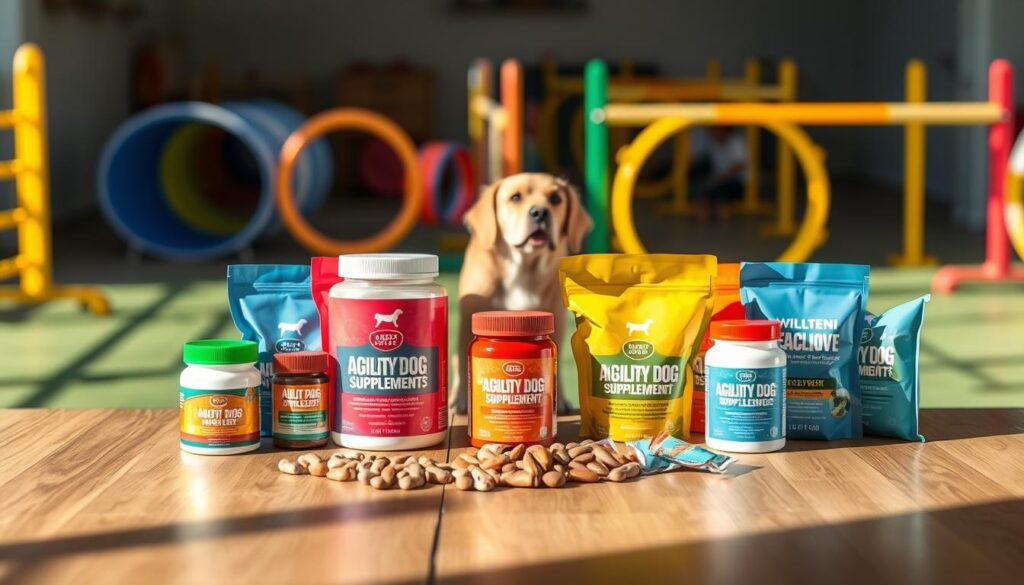As an agility dog owner, you want your dog to perform at their best. It’s important to know what nutrients they need. A balanced diet is key for your dog’s athletic performance.
Agility dog nutrition must be nutrient-dense to meet the high energy requirements of active dogs. A carefully crafted diet that supports both health and performance is crucial for success in agility training and competitions..
Research shows active dogs need diets rich in unadulterated dietary fat. They also need high-quality animal-based proteins. Antioxidants are crucial for their health, and fresh foods provide these essential nutrients.
Understanding a balanced diet is crucial for your dog’s performance. We’ll explore the top nutrient secrets. This includes the role of antioxidants, fats, and proteins in a canine athlete diet.
Table of Contents
Understanding the Unique Nutritional Needs of Agility Dogs
When you start agility training with your dog, you’ll see they need different food than regular dogs. Agility training places significant strain on their bodies. So, they need a diet rich in high protein to help their muscles grow and heal. Also, agility dog supplements can help make up for any missing nutrients in their food.
Choosing the right performance dog food is key for agility dogs. Their food should have lots of nutrients for energy, muscle function, and health. Here are some important things to think about for their diet:
- Premium protein sources to aid in muscle growth and repair.
- A balanced mix of carbohydrates and fats to provide energy
- Essential vitamins and minerals to support overall health
Feeding your agility dog a balanced diet that meets their special needs is crucial. It helps them perform well and stay healthy. Always talk to a vet or a dog nutrition expert to find the best performance dog food and agility dog supplements for your dog.
With the right food and training, your agility dog can do great things. Always put their health and happiness first. And don’t hesitate to get professional advice when you need it.
| Nutrient | Importance for Agility Dogs |
|---|---|
| Protein | Supports muscle growth and repair |
| Carbohydrates | Provides energy for training and competition |
| Fats | Supports energy production and overall health |
Essential Macronutrients for Peak Performance
If you own an agility dog, you know how vital the right nutrients are. The best food for active dogs should have a mix of protein, carbs, and fats. These nutrients are key for your dog’s health and performance.

Protein helps build and fix muscles. Carbs give energy for quick activities. Fats provide a major source of energy and contribute to overall health. Look for a diet with lots of fat and protein, but fewer carbs.
When picking your dog’s diet, keep these points in mind:
- Choose high-quality protein like chicken or fish.
- Go for easy-to-digest fats, like fish oil.
- Incorporate complex carbohydrates such as whole grains, fruits, and vegetables.
Give your dog a balanced diet to support their health and agility. Pick the best food for active dogs. Always talk to your vet to find the right diet for your dog.
| Nutrient | Importance |
|---|---|
| Protein | Building and repairing muscles |
| Carbohydrates | Providing energy for short bursts of activity |
| Fats | Rich source of energy and supporting overall health |
Protein Requirements for Canine Athletes
As a dog owner, you want your canine athlete to get the right nutrients. A high protein diet is key for muscle building and repair. It’s vital for a dog’s diet, especially for athletes. Animal proteins like chicken, beef, and fish are better than plant-based ones because they’re easier to digest.
Feeding your dog a balanced meal with protein after exercise helps with muscle recovery. The daily protein needs vary by dog, but a good rule is 1-1.5 grams of protein per pound of body weight. For example, Royal Canin’s Sporting Life Trail diet has 26% protein, while Eukanuba’s Premium Performance diet has 30%.
| Dog Food | Protein Content |
|---|---|
| Royal Canin Sporting Life Trail | 26% |
| Eukanuba Premium Performance | 30% |
| Eukanuba Active Performance | 28% |
By giving your canine athlete a high protein diet and a balanced diet, you help them perform well. This also keeps them healthy and happy.
Carbohydrates: Fueling Your Dog’s Agility Success
Carbohydrates are key in agility dog nutrition, giving energy for athletic performance. As a dog owner, you want your dog to have the right nutrients for top performance. Performance dog food with complex carbs offers sustained energy during training.
A balanced diet with carbs, proteins, and fats is crucial for agility training. Eukanuba’s Premium Performance diets, for example, have formulas for different activity levels. The 21/13 SPRINT formula is high in carbs for quick energy.
Carbohydrates in agility dog nutrition offer several benefits:
- They provide energy for quick activities.
- They help keep energy up during training.
- They aid in recovery after hard activities.
Adding the right carbs to your dog’s diet supports their athletic performance and health. Talk to your vet to find the best performance dog food for your agility dog.

A balanced diet with carbs, proteins, and fats is key for agility training and health. Choosing the right performance dog food and watching your dog’s progress helps them reach their agility potential.
| Diet Formula | Activity Level | Carbohydrate Content |
|---|---|---|
| Premium Performance 21/13 SPRINT | Short bursts of activity | High |
| Premium Performance 26/16 EXERCISE | Activities lasting up to two hours | Moderate |
| Premium Performance 30/20 SPORT | Activities lasting up to four hours | High |
Healthy Fats and Their Role in Athletic Performance
Exploring athletic dog nutrition shows the importance of healthy fats. They help keep energy up, support skin and coat, and aid in vitamin absorption. Healthy fats are key in agility dog supplements for better performance.
Balancing omega-3 and omega-6 fatty acids in your dog’s diet is essential. This balance fights inflammation, keeps skin and coat healthy, and supports joints. You can find these fats in fish oil, flaxseed oil, and some nuts and seeds.
Omega-3 and Omega-6 Balance
Finding the right balance of omega-3 and omega-6 fatty acids is key. Aim for a 5:1 or 10:1 ratio of omega-6 to omega-3. Talk to your vet to find the best balance for your dog.
Fat Sources for Sustained Energy
Healthy fats in agility dog supplements give your dog lasting energy. Good sources include avocado, nuts (except Macadamia and Walnut), oils, seeds, and full-fat yogurt. These help your dog’s energy, especially during tough training or competitions.
Adding healthy fats to your dog’s diet and using agility dog supplements boosts their health and performance. Always check with your vet before changing your dog’s diet or adding supplements.
What Are the Nutritional Needs of Agility Dogs Throughout Training Seasons
When thinking about what are the nutritional needs of agility dogs, remember that these needs change with each training season. Agility dog nutrition is key for top performance. It’s not just about giving enough calories. The right nutrients are crucial for energy, muscle repair, and health.
A study on agility dogs shows their nutritional needs depend on several factors. For example, dogs in high-energy sports like agility might need up to 4000 calories daily. Dogs in lower-energy activities, like scent work, might need less.
For agility dog nutrition, focus on quality over quantity. A balanced diet with protein, complex carbs, and healthy fats is best. Omega-3, MSM, and glucosamine supplements can also help with inflammation and joint health.
- Watch your dog’s body shape, weight, coat, and energy to ensure their diet is right.
- Change your dog’s diet based on their training schedule and intensity.
- Think about adding supplements to boost their athletic performance and health.
| Nutrient | Importance for Agility Dogs |
|---|---|
| Protein | Essential for muscle repair and growth |
| Complex Carbohydrates | Provide sustained energy and support digestive health |
| Healthy Fats | Support skin and coat health, as well as joint health |
Hydration Strategies for Competition Days
As an owner of an active dog, it’s key to keep your pet hydrated, especially on competition days. The right food for active dogs should have the right mix of nutrients and water. Agility dog supplements are also important for keeping your dog hydrated.
Here are some tips for keeping your dog hydrated on competition days:
- Make sure your dog drinks plenty of water all day, aiming for about 0.5 deciliters per kilogram of body weight daily.
- Give your dog a small amount of water, about 0.5 to 1 deciliter for small dogs and a few deciliters for larger dogs, before each run.
- Try using wet foods on competition day mornings for extra fluids.
Electrolyte balance is also key for staying hydrated. Recovery drinks with lots of carbs can help replace lost electrolytes and boost your dog’s performance. Choose the best food for active dogs and think about agility dog supplements for better health and performance.
By using these hydration tips, you can help your dog do their best and stay healthy during the competition.
| Hydration Tip | Benefits |
|---|---|
| Provide plenty of water | Maintains optimal performance and supports overall health |
| Offer a small top-up of water before each run | Replenishes fluids and electrolytes |
| Use wet foods on competition day mornings | Provides additional fluids and supports hydration |
Supplementation for Athletic Dogs
If you own an agility dog, you know how vital the right nutrients are. They boost your dog’s agility and health. Agility dog supplements can fill nutritional gaps and support their active lifestyle.
There are many supplements to choose from. Joint support can prevent injuries and keep joints healthy. Omega-3 fatty acids and antioxidants boost endurance and reduce inflammation. Recovery aids like probiotics and L-carnitine help after exercise.
Look for glucosamine, MSM, and omega-3 fatty acids in supplements. These support joint health, reduce inflammation, and improve overall well-being. Adding these to your dog’s diet can enhance their athletic performance and health.

Always talk to your vet before adding supplements. They can guide you on the best supplements for your dog’s needs.
Meal Timing and Competition Day Nutrition
When getting your dog ready for agility competitions, meal timing and nutrition are key. A well-planned diet is crucial for your dog’s performance and health. Agility dog nutrition should give the right energy and nutrients for top performance.
Experts say to feed your dog 8 to 16 hours before exercise, based on meal size. For very intense exercise, feed only one-third of their daily calories 4 to 8 hours beforehand. A diet with 30% protein and 20% fat helps use fat for energy during exercise. Choosing performance dog food that fits these needs is a great choice.
Feeding your dog after exercise is also important. It helps replace amino acids and glycogen, aiding muscle recovery and growth. Avoid sudden diet changes and slowly increase food intake over 5 to 7 days to prevent stress. A balanced diet and proper meal timing can boost your dog’s performance and health.
Some important tips for competition day nutrition include:
- Provide fresh water to prevent dehydration
- Give a balanced meal 8 to 16 hours before exercise
- Limit meal size for intense exercise
- Replenish nutrients after exercise
By following these tips and picking the right performance dog food, your dog will perform at their best and stay healthy.
Common Nutritional Mistakes to Avoid
As an agility dog owner, knowing what your dog needs is key. The right amount of nutrients is crucial. Too much or too little can harm your dog’s health and agility. Agility dog supplements can help, but use them wisely to avoid problems.
Some common mistakes to steer clear of include:
- Overfeeding can result in obesity and associated health problems.
- Inadequate recovery nutrition, which can hinder your dog’s ability to recover from intense training sessions
- Supplement misconceptions, such as using the wrong type or amount of supplements, which can be harmful to your dog’s health
Always talk to a vet or canine nutritionist for the best nutrition plan. This includes the right use of agility dog supplements. By avoiding these mistakes and providing the right nutrients, your dog will perform better and stay healthy.

Creating Your Dog’s Personal Nutrition Plan
As a dog owner, you know how crucial a balanced diet is for your furry friend. Every dog is unique, and what suits one might not fit another. To craft a nutrition plan for your dog, think about their breed, size, age, and how active they are.
A canine athlete diet should boost your dog’s performance. It must match their energy use and nutrient needs. For instance, small dogs might need more meals due to their high energy. Large dogs, on the other hand, might benefit from lean protein and less fat to keep their weight in check and support their joints.
Here are some tips for making a nutrition plan for your dog:
- Small breeds (under 20 pounds): ½ to 1 ¼ cups of food per day
- Medium breeds (20–50 pounds): 1 to 2 ½ cups of food daily
- Large breeds (50–100 pounds): 2.5 to 4 cups of food daily
- Giant breeds (over 100 pounds): 4 or more cups daily
Always talk to a vet to find the right diet for your dog. They can consider your dog’s specific needs and health. A tailored diet helps your dog perform well and stay healthy.
| Breed Size | Food Intake | Feeding Frequency |
|---|---|---|
| Small | ½ to 1 ¼ cups | 3-4 meals/day |
| Medium | 1 to 2 ½ cups | 2-3 meals/day |
| Large | 2 ½ to 4 cups | 2 meals/day |
| Giant | 4+ cups | 2 meals/day |
Conclusion: Optimizing Your Agility Dog’s Diet for Success
Starting your agility dog’s journey means a good diet is key. It’s the base for their top performance and health. Knowing their nutritional needs helps you make a diet plan that boosts their sports skills and helps them recover.
Adding the right mix of proteins, carbohydrates, and healthy fats is vital. It affects their energy, muscle growth, and stamina.
It’s important to talk to your vet often and keep up with new athletic dog nutrition findings. The right food and feeding methods can help your dog excel in agility. It also helps them enjoy a long, healthy life by your side.
FAQ
What are the unique nutritional needs of agility dogs?
Agility dogs need a special diet. This diet should include protein, carbs, and healthy fats. These nutrients help them perform well in agility training.
How does agility training impact a dog’s nutritional requirements?
Agility training makes dogs burn more energy. This changes their nutritional needs. It’s key to feed them right to support their training.
What are the essential macronutrients for peak performance in agility dogs?
Agility dogs need protein, carbs, and healthy fats. These nutrients give them energy, help build muscle, and aid in recovery.
What are the protein requirements for canine athletes?
Protein is vital for dogs in training. Knowing the best protein sources and amounts is crucial. It helps them perform better.
How do carbohydrates fuel agility dogs?
Carbs are a key energy source for agility dogs. Knowing how much to give them is important. It helps them do their best in competitions.
What is the importance of healthy fats for athletic performance in dogs?
Healthy fats are key for dogs in training. They provide sustained energy. The right fats can greatly improve your dog’s performance.
How do the nutritional needs of agility dogs change throughout training seasons?
Agility dogs’ nutritional needs change with the seasons. It’s important to adjust their diet accordingly. This helps them perform at their best.
What are the best hydration strategies for agility dogs on competition days?
Keeping dogs hydrated is crucial, especially on competition days. Good hydration strategies include pre-competition drinks and post-run recovery. This keeps them hydrated and performing well.
What types of supplements can benefit athletic dogs?
Supplements can help athletic dogs. They include joint support, performance-enhancing nutrients, and recovery aids. These supplements offer extra benefits.
How important is meal timing and competition day nutrition for agility dogs?
Meal timing and nutrition on competition days are very important. Proper fueling before and during competitions can greatly impact their performance.
What are some common nutritional mistakes to avoid with agility dogs?
Avoiding common nutritional mistakes is key. These include overfeeding, not providing enough recovery nutrition, and misunderstanding supplements. These mistakes can harm their performance.
How can I create a personalized nutrition plan for my agility dog?
Every dog is different. Creating a personalized nutrition plan is essential. It should meet your dog’s specific needs. This helps them perform their best in agility.


1 thought on “Boost Your Agility Dog’s Performance: Top Nutrient Secrets Revealed”
Comments are closed.